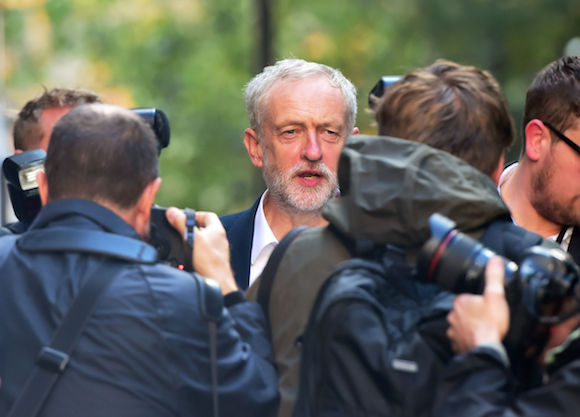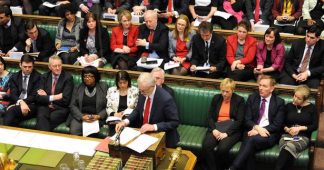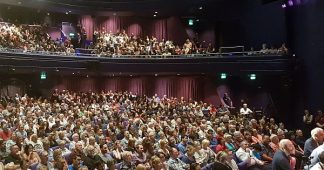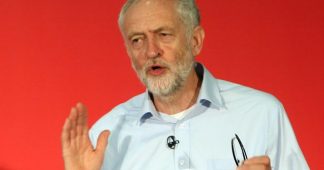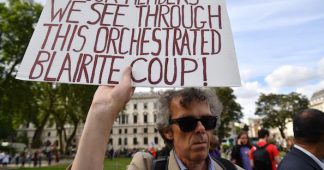The astonishing scenes of the last week in UK politics have seen the figureheads of the establishment media and politics go to war with Jeremy Corbyn. This is because the permanent political class is freaking out over Corbyn’s rising popularity among formerly disillusioned voters, and how that imperils their grip on power. Here is how.
Over with the Labour establishment, they tried to halt Corbyn’s rise from the get-go. Remember the purge, scaremongering and refusal to work with a Corbyn front bench?
The reason Labour had a new leadership election process last time round, was the result of the parliamentary Labour Party and the NEC long term efforts to diminish the power of Trade Unions. By widening the vote to Labour voters, and quieting the voice of Trade Unions, the Blairite factions of the party gambled on those new voters being to the right of the Unions.
But they got a shock. It turned out that many were actually well to the left, and ready to take a chance on a democratic socialist like Corbyn. So, the Party responded to those new supporters as ‘infiltrators’.
This was a bizarre move, because if Labour don’t win back these voters, they are sunk in 2020. Labour need to win an extra 106 seats next election to gain a majority, an almost impossible task. But that almost impossible task becomes totally impossible without a mass, popular movement to re-engage the public. Just 24% of people voted Conservative in the last election, 76% didn’t. The largest gains went to socially democratic populists the SNP, who killed Labour in Scotland. The biggest losers were the Liberal Democrats, the only ‘centrist’ party in town.
So why would the Parliamentary Labour Party NOT want to harness the power of a populist, social democratic movement? Especially when it is the only chance they have of regaining office in 2020. Or sooner, if a general election is called in the wake of recent events.
It is becoming ever more clear that the Parliamentary Labour Party in Westminster has become a part of a permanent political class alongside their Tory and Liberal Democrat counterparts. Disengagement and voter apathy means a fairly stable job, a few seats lost and won either way each election and no big surprises. The chance to earn a great wage and pass policies which guarantee lucrative consultancy/director roles after politics. All done with the passive acceptance of a disaffected electorate, half of whom don’t even bother to vote anymore. To this permanent political class, a popular movement based on social democratic values is about as welcome as a fart in an elevator.
This is why Harriet Harman planned to cull over 100,000 so-called ‘infiltrators’ from the vote. This is why self-appointed voice-of-the-left Polly Toynbee, the Guardian editorial team, and most of the press (right and liberal) were busily character assassinating Corbyn and anyone who would give him their vote.
But despite all efforts, Corbyn won with a greater landslide in 2015, than Blair did in 1994. The ‘unelectable’ Corbyn galvanized a thumping majority against a hostile media, commentariat and even parliamentary party.
Since then, membership of the party as doubled, and Corbyn moved ahead of the Conservatives in the polls.
How did the conservative permanent political class respond? They freaked out. This freak out is best summed up by this near-hysterical tweet by Prime Minister David Cameron.
How did the public respond to the Corbyn win?
Over 15,000 people joined the Labour Party within 24 hours, and they’re still joining. This is significant. Back in 2011, political party membership in the UK was at an all time low; just 0.8% of eligible adults in the UK were members of political parties, versus 3.8% in 1983. But while general membership was in decline, membership of ‘other’ parties was on a steep rise. This was a signpost that perhaps the problem was not the apathy of the public to politics, but the apathy of the political class to the aspirations and values of the public.
But since the No Vote in Scotland, the rise of the SNP and Greens north of the border, and the victory of Corbyn – large sections of the public are reengaging with the political system again in ways not witnessed for decades.
Between 2002 and 2013, the SNP membership grew to just over 20,000. In the two year since, it rocketed to well over 100,000.
With it’s freshly-arrived members, the Labour Party swelled to around 290,000 members – more than the Conservatives (134,000), Liberal Democrats (61,000) and Green’s (60,000) combined.
Furthermore, it appears that Jeremy Corbyn plans to galvanize the power of this membership to bring democracy into policy making. In short, it looks like Labour members will be supporting policy development in a way unheard of by mainstream parties before now. This would remove the power of the front bench and parliamentary party to act against the will of the membership – this should empower Corbyn’s team to drive through the radical social democratic policies he has in mind.
In short, there is now a distinct possibility not only that a truly progressive, social democrat Labour Party could win in 2020, but worse, that they could topple an unpopular Tory government even before then. An unconstrained Labour Party with Corbyn at its head, and John McDonnell as Shadow Chancellor, could deliver the sort of coordinated opposition, uniting with workers and their unions, disenfranchised groups and their campaign groups – to start landing big punches now. The sorts of actions that Blue Labour would never take, could now be back on the table. There could be general strikes, there could be mass rallies utilising the full power of these groups, there could be the kind of concerted, unrelenting uproar that tore the Tory Party apart in the early 1990’s.
How did the Parliamentary Labour Party respond? With mutiny.
But their grand coup is now laying in tatters. They had no vision, no figurehead, and no plan. Meanwhile, the Labour membership, Momentum, the unions and Corbynites around the country did. After the attempted coup, a petition called “A vote of confidence for Jeremy Corbyn after the Brexit vote” gathered more than 230,000 signatures in a week and continues to rise. A hastily convened confidence rally outside parliament this week saw more than 10,000 supporters pack out Parliament Square at a moment’s notice to back the Labour leader. The leaders of the 12 strongest unions in the United Kingdom also wrote a letter of support following the attempted coup.
This weekend, there have been rallies across the country with tens of thousands of people joining to demand Corbyn remain in place and lead the Labour party back to its natural home – the labour movement.
People continue to rally at the hashtag #Corbyn4All to demonstrate the diversity of Corbyn supporters which the mainstream media and the neoliberal establishment of the party refuse to acknowledge.
This is unprecedented in modern history. No one marched to save Tony Blair. No one marched to save Gordon Brown. No one is marching to save David Cameron.
The permanent political class is freaking out because the only thing that can beat out Project Fear, is Project Hope. A Tory-lite Labour opposition was and is never going to win in 2020, but an energetic and awakened Labour movement can. Even worse, if they do win, there is a very real chance that the domestic and foreign policy of Britain could transform in a truly radical way. We could be a few months or years away from the most progressive government since Clement Attlee’s post-WWII government delivered the NHS, a national education system, nationalised transport and energy, and rolled out the biggest social housing programme in our history. This is an electoral choice that the UK hasn’t had the opportunity to make in decades.
The permanent political class is facing the most real and present threat to their power since 1979. They are going to throw every weapon in their armoury at ensuring that doesn’t happen. But none of those weapons is more powerful than a tight-knit, grass roots movement with its eye on shared vision of an inspiring future. They don’t fear Corbyn because he might be unelectable, they fear him because he, and the movement he represents, might be unstoppable.
